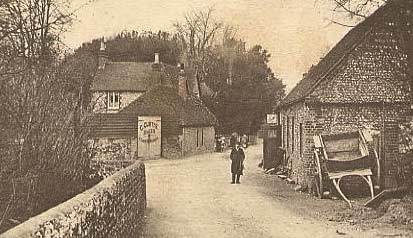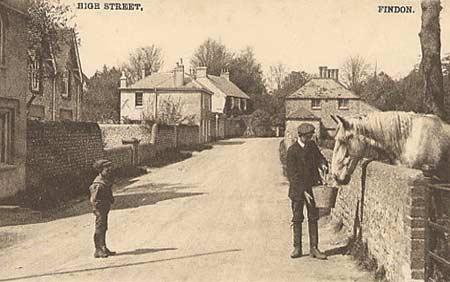|
It was in 1939, when Tony Hammond was just a nine-year-old youngster, that he left his home town of Worthing for Findon, some seven miles to the north.
'At the start of the war my mother and I moved to Findon and stayed initially with my Gran in one of the old council cottages. My father and my elder brother remained in Worthing as they were both working at the Lady Bee shipyard in Shoreham. The move to Findon was something of a cultural shock for me, off came the town shoes and on went the heavily studded boots, and dirty knees became the order of the day. Fortunately for me I was not a complete stranger to the Findon lads for they took no prisoners, and whilst I had my cousin George to show me the ropes I still had to prove myself.
Surrounded by the lads from the Oval I was asked, 'What can you do?'
Before I had time to reply cousin George piped in with, 'He can run fast'.
'Bet he can't beat Simo,' came the reply.
'Bet he can,' said George and the next thing I knew I was matched against Simo for one lap of the Oval. I managed to scuttle home first and as a reward received only a few minor pushes and only one quite hefty thump from Simo. George however had a smile on his face, and the penny in his pocket was the result of a side bet, but most important of all I was in!

Findon village smithy (on the right of the picture) in Nepcote Lane. On the left is the junction with Cross Lane.
|
I soon learnt to climb trees, what you could safely eat from the hedgerows , and where the best scrumping could be found. Then there were the stone fights: two sides would each build a defence of some sort and then proceed to throw stones at each other. How we didn't all end up in hospital I will never know.
St John the Baptist School at Findon was a cold place in winter with the solid fuel fires in the classrooms barely raising the temperature, except for the teachers who had their desks strategically placed. The outside toilets were placed way across the other side of the playground and consisted of nothing more than a wooden seat and a galvanised iron bucket. Now that was really cold!
The school milk was collected from the local farm by the boys, and I can remember the struggle it was to get up School Hill with a crate of milk, and on frosty mornings the school steps presented a real problem. One advantage of the cold weather was that the milk was drinkable, unlike a hot summer when it resembled cottage cheese.
Findon during the war was an exciting place for a young lad to be; most of the large houses had been requisitioned by the Army and there was always something going on. The manoeuvres on the Downs were somewhat spectacular. Armoured vehicles charging about all over the place, live rounds being fired by the thousands, mortar bombs raining down, flame throwers scorching everything in sight, and artillery shells whining over the village. If that wasn't enough, low flying Lysander aircraft would drop thunderflashes on anything that moved.
With so much going on, several of us lads managed to put together private arsenals, this highly dangerous pastime was brought to a sudden halt when my friend Richard Carey suffered extensive burns to his face whilst setting light to the contents of a thunderflash.
Several aircraft came down at Findon and the one that I remember best of all was an unarmed high speed reconnaissance spitfire painted a beautiful shade of blue.

A young boy watches a horse being fed in High Street, Findon (looking north).
|
It wasn't all crash bang wallop, for the most part Findon during the war was a quite place; the only regular traffic was the Southdown Bus that ran through the village. One of my favourite pastimes was roller skating on the main roads, and I skated from the village to North End and back on many occasions; just imagine now being able to skate on the A24 during the rush hour! The stretch of road from the Gun inn to the village hall was a particularly smooth piece of road, and it made a fine place to play roller hockey.
The move to secondary school involved catching a normal service bus to Thakeham via Storrington, where it seemed that we spent most of our school time digging up the playing fields and growing vegetables for the school kitchen.
The days were long, the summers were hot and Findon was a very pleasant place to be, but all good things come to an end and in 1944 I moved to Littlehampton to start a seven year apprenticeship as a marine engineer.
| |


